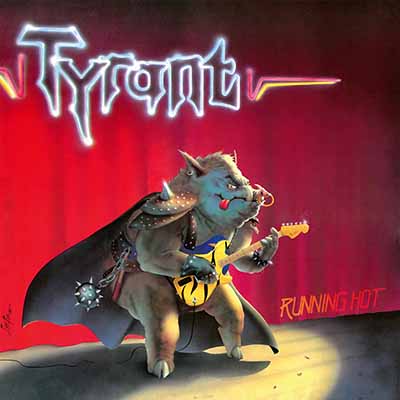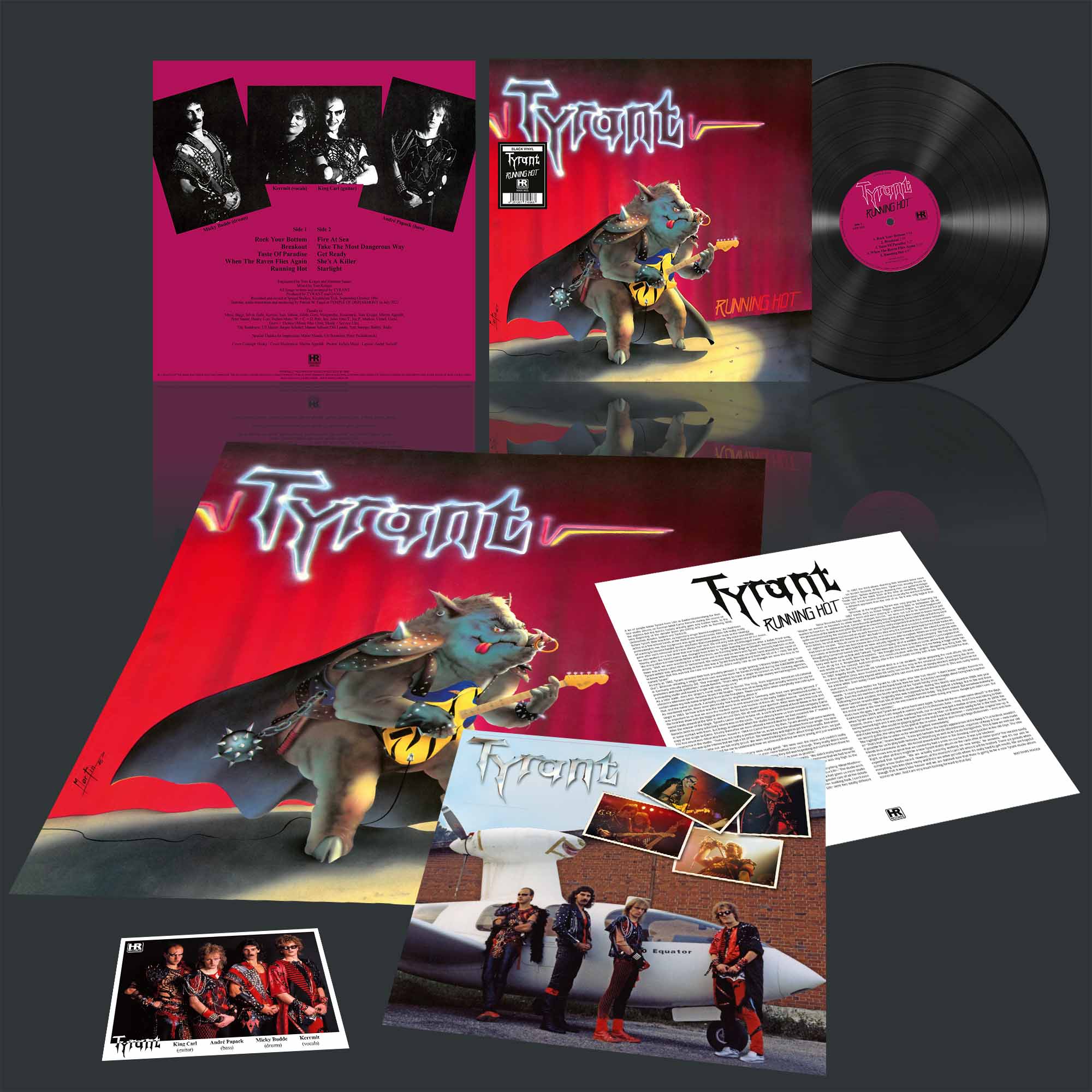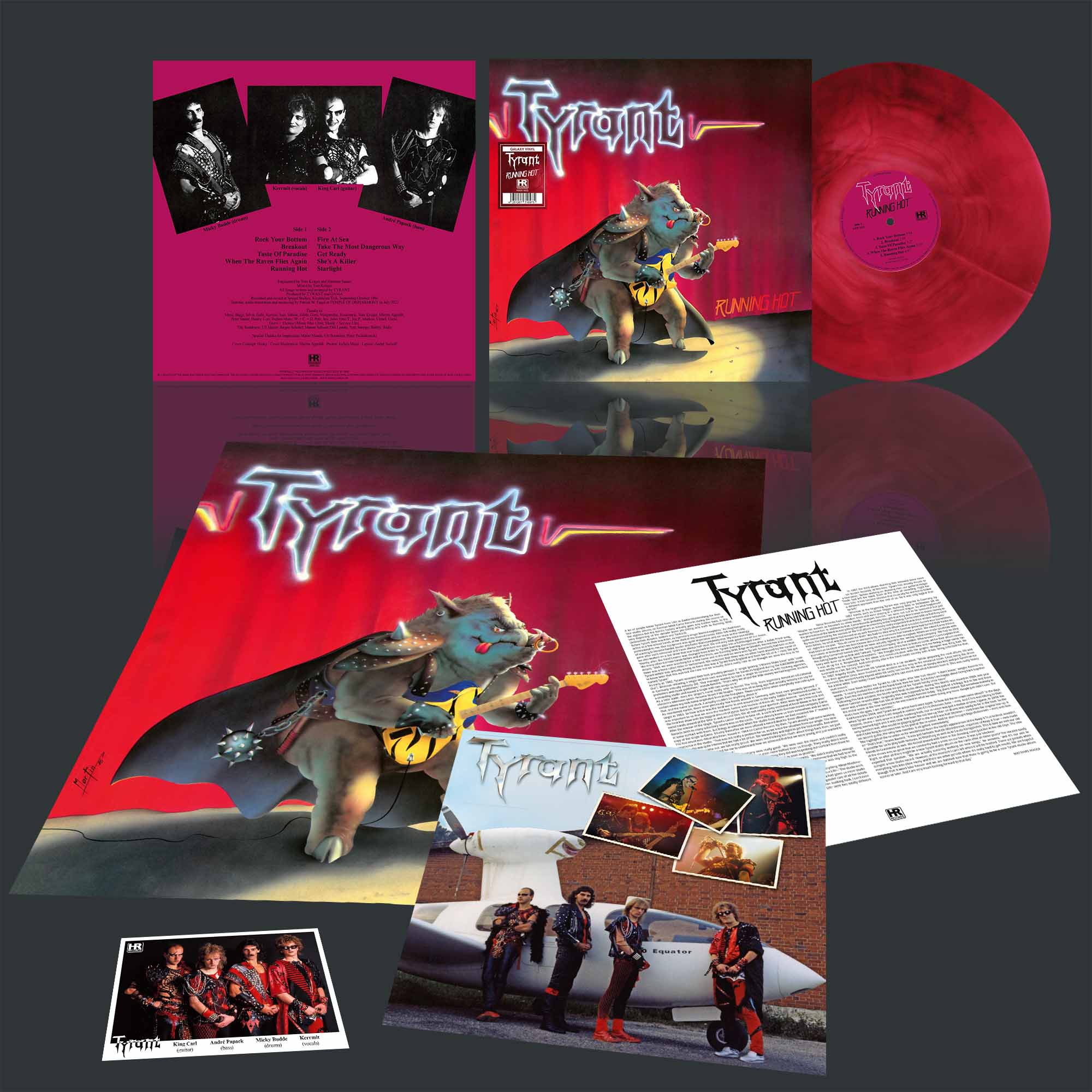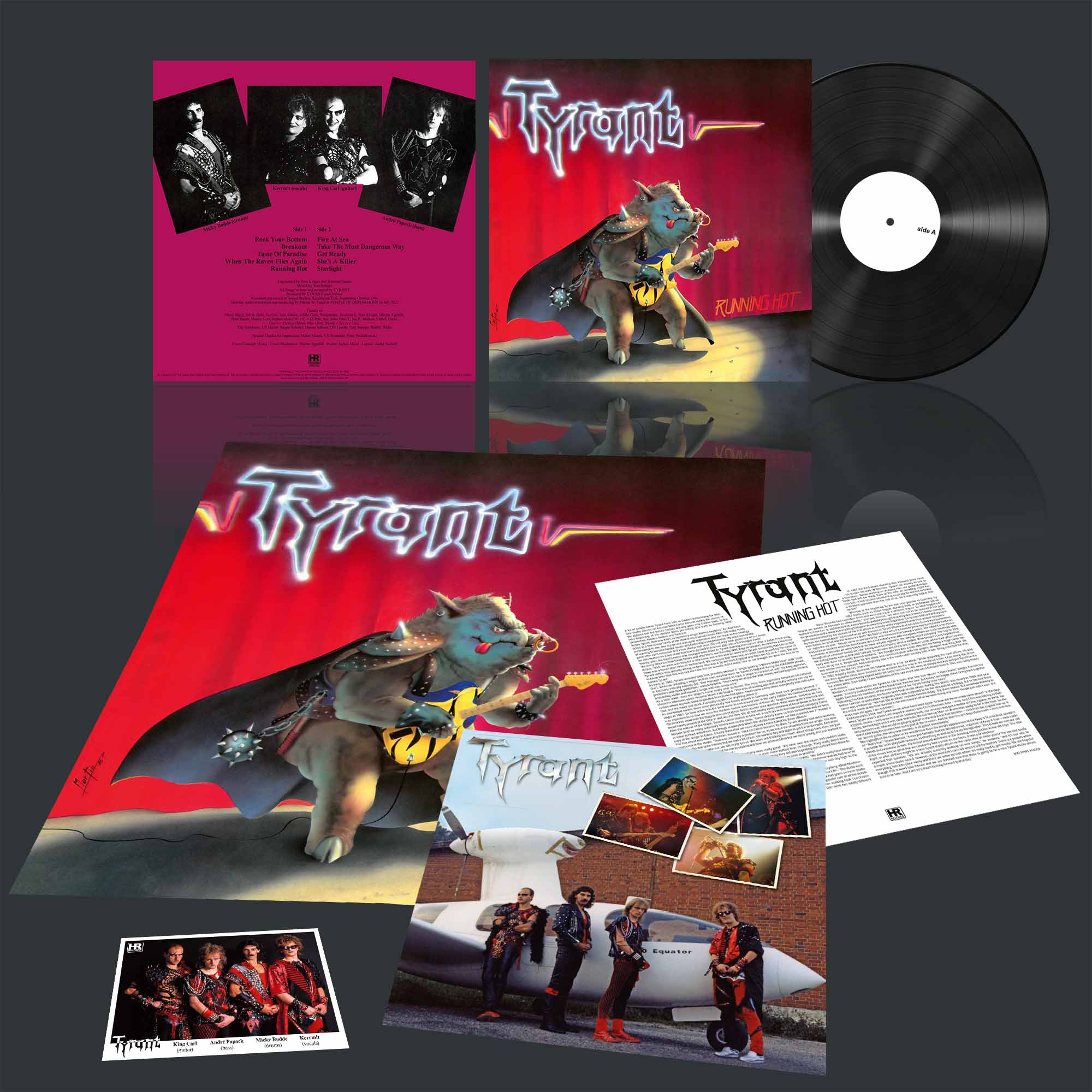 | ||||
| TYRANT - Running Hot LP | |
HRR 905LP, ltd 500, 200 x black + 300 x galaxy effect vinyl, 425gsm heavy cardboard cover, insert, poster | |
| Kerrmit - vocals King Carl - guitar André Papack - bass Micky Budde - drums | |
| 01 Rock Your Bottom 02 Breakout 03 Taste of Paradise 04 When the Raven Flies Again 05 Running Hot 06 Fire at Sea 07 Take the Most Dangerous Way 08 Get Ready 09 She's a Killer 10 Starlight | |
AVAILABLE | |
Mastered for vinyl by Patrick W. Engel at Temple of Disharmony
A lot of people know Tyrant from Ulm in Baden-Württemberg for their four studio albums on German label Gama Records during the course of the eighties but the band’s history actually goes way further back, to the very beginning of the decade (even pre-dating acts such as Running Wild, Destruction, Kreator, Sodom and Tankard).
Before Tyrant, their was Killer, as legendary singer Kerrmit explains: “As I had been active in a few school bands at the start of my musical career, Killer felt really, really professional to me. Our equipment was quite impressive and we stuck to the strategy of wanting to become harder, louder and faster than everybody else. My voice was totally gone after each rehearsal and I was always half deaf. We not only took great care of our music, we also worked on a live show that was supposed to turn our gigs into a full-fledged event.”
Shortly after, the band’s name was changed from Killer to Tyrant (naming themselves after a Judas Priest song, like many other German bands before and after them, see Running Wild, Rage or Grinder). Kerrmit has a few more details: “Well, we were searching for a new name and in the end we went with Tyrant. Somebody had told us that there was a band called Killer in Switzerland. We reckoned that there was no other band around by the name of Tyrant (which was actually wrong as there also was a Tyrant from England and from the US of A – mm). We got to know later that this was not the case but we actually didn’t really care as we thought we were the first to be named Tyrant.”
As early as 1982, Tyrant recorded their first, privately pressed 7” single (pairing “I Wanna Make Love” with “Look Out”). Whereas releasing a single on their own was the norm for bands in England during the NWOBHM period, in Germany virtually nobody did. “Our manager wanted to have a single to connect us with booking agencies, promoters and music publishers,” reveals Kerrmit. “That’s why we all put the little money we had together, booked a recording studio and issued a single with two songs on it.”
As a little aside, does the singer’s name really refer to Kermit The Frog, from legendary American educational children’s television series »Sesame Street«? He laughs: “This was all so long ago that actually nobody can say for certain where my nick name originated from in the first place. There came a time when everybody was calling me that, and the name just stuck. I actually couldn’t do anything about it.”
As mentioned earlier, there were preciously few bands around in Germany with their own privately pressed 7” single in 1982. So how active was the local scene in and around Ulm in the early 1980s? “As mentioned earlier, it was important to us that we were the hardest, fastest and loudest of them all,” laughs Kerrmit, “and that we had the best live show with the biggest amount of pyros. But to answer your question, there were quite a few rock and metal bands around at the time in and around Ulm. We all met nearly every weekend at local shows in the area.”
After the release of the single, Tyrant’s career started to take off. A contract with German record company Gama Records (with its many subsidiary labels) was on the cards: “Gama already knew us from somewhere and we were in loose contact with them. But things accelerated when the studio boss where we had recorded the 7” mailed a copy of the single to Gama. Shortly thereafter we were offered a record deal for three albums.”
The first result was »Mean Machine«, issued in 1984 on Camel Records. By then, Tyrant already had some working experience in the studio: “That was not really a problem for us, as we knew the situation from our single. The time in the studio was quite intense but we had a lot of fun. We worked day and night to get the best results. And when the record finally came out, we felt really proud. We were not thinking too much about things back then, we just did it. Looking back, it’s hard for me to understand how we achieved that but we were young and just wanted to have fun – that’s all there was to it.”
Press reactions for »Mean Machine« in Germany were really good: “We were over the moon and couldn’t really believe all the positive reviews. Gama Records was even more baffled than us though. They really didn’t know what to do with us from then on, to be honest. So the fist thing they did was to prolong our contract from three to five albums and put pressure on us to start recording new material as soon as possible.”
The result was »Fight For Your Life« in 1985 (this time issued on Scratch Records). “We didn’t really have enough new songs for a second album,” explains Kerrmit, “but the pressure by Gama was so immense that we had to write as many new tracks for a second album in the shortest possible time. And our motivation was sky high as the reactions to the first album had been so enthusiastic and it all worked so well.”
Numbers such as “Dark Eyes Of London” or “Up The Hammer” were indeed on par with everything »Mean Machine« had to offer. However, there were differences between »Mean Machine« and »Fight For Your Life«: “The studio work for »Fight For Your Life« actually was quite different in comparison to the début. Gama had given us more studio time this time around and had booked an engineer from the UK. We as a band took greater care of all the details and wanted to make everything even better and more special than on »Mean Machine«. Looking back, I can’t even say If the end result was superior, as I think »Mean Machine« and »Fight For Your Life« were two totally different albums in my eyes.”
In 1987, the third album »Running Hot« followed (once more on Scratch Records). At this time, Tyrant had already shrunk to a four-piece: “Before working on »Running Hot«, our guitarist Holger Thiele had left the band. Even at the time of recording »Fight For Your Life« it had become obvious that musically he wanted to follow a different approach than the rest of us. So it was only logical that he left.”
Whereas at the beginning Tyrant was very popular in Germany, by 1987 bands such as Grave Digger, Running Wild or Helloween (all on Noise Records) had overtaken them and were playing in a different league. So what happened? “Maybe we weren’t as focussed as other bands,” analyses Kerrmit, “we were not out to be successful but just wanted to have fun. In addition to that, Gama Records probably thought that they didn’t need to invest money in the promotion of the band as everything had gone so smoothly in the beginning. Gama later told us that they were quite overwhelmed by the success of the first album as nobody really expected that in their wildest fantasies.”
By now, the German press had moved on as well. Reviews of Tyrant albums all of a sudden turned sour (sometimes even bitter). So what was the reason for that? “We had no idea why the German press had turned their backs on us”, sighs the vocalist. “This all came so unexpectedly, as if someone had turned a switch. We asked Gama if there had been an incident which we didn’t know about but nobody was able to explain. When we made small talk with journalists at festivals we were told that we were actually signed to the ‘wrong record company’. We had no idea though why Gama had turned into the ‘wrong record company’ all of a sudden. Who knows? I can’t explain that.”
Pre-dating bands such as Risk and Tankard, Tyrant were one of the first to feature comic art for their album covers (very well done so as well). Kerrmit explains: “We thought this was a cool idea and me being a huge comic fan I was all up for it. Responsible for the ideas and communication with the graphic designer was King Karl. He was totally into the concept. And everybody else n the band could identify with it too. Being criticized for that, surprised us a bit. But hey, that’s life.”
In 1987, tragedy struck. Drummer Oli Schmid died in a car accident: “While preparing the next album, Oli and our then guitarist Linus were involved in an accident on the way to the rehearsal room. Linus being the driver survived the accident badly injured while Oli sadly lost his life. We were all deeply shocked and put Tyrant on ice for a little while. Even today I have flashbacks of this sad event and what followed from it. This was really heavy stuff indeed.”
Wouldn’t it have been better for Tyrant to call it quits after fate had struck? “I don’t know,” weighs Kerrmit his words. “It nearly marked the end of the band back then for sure. But today I am happy about being back together again. Even the old members of the crew are part of the Tyrant family once more.”
Following this fatal accident, the fourth (and final) studio album »Ruling The World« was issued in 1989, one year before German re-unification. Originally this was supposed to be the first part of a trilogy. But in the end there never was a follow-up. “We had lots of ideas,” explains Kerrmit today. “Big plans indeed. But somehow nobody in the metal scene at the time seemed to be interested in what we were doing any more. People just didn’t care. But that’s how life goes. I am not bitter.”
Fast forward to 2024, and Tyrant are an active band once again. So how did the re-union come about? “In the days when Tyrant wasn’t active I still stayed in contact with Chris (Peterson, bass – mm). And Chris was talking to Marc (Oppold, drums – mm) once in a while. Looking back, our re-union was just a matter of time, I guess. In 2019, the timing seemed right and it was clear that from the old line-up Marc on drums was surely to be in the boat. So the only question was, who would be playing guitar? In the end it was Ralf (Hollmer – mm) from the original line-up. It didn’t take long to convince him to be part of the re-union. And he also brought Ingo (Autenrieth – mm) with him on second guitar, the only new member. It all gelled immediately.”
The highlight of the re-union so far would have been the band’s appearances at the Keep It True festival, wouldn’t it? “That’s true,” beams Kerrmit. “It was just fantastic that Oli (Weinsheimer, organizer of Keep It True – mm) made it possible for us to play both festivals, in Würzburg as well as in Lauda-Königshofen. This is how we met our old friends in Gravestone as well. We fooled around with them in the dressing room just like in the old days. The vibe at the shows was so great that we constantly had a smile on our faces. It was just fabulous.”
Right, so after all there might be a new Tyrant studio album on the cards after all these years? The vocalist surely expected that question. “We are actually currently working on new songs,” he answers, “and it’s our aim to compile a new studio record. However, at the moment I can’t tell when it will be finished. There are periods when everything falls into place nicely and there are other periods where it’s really hard to get results. We are hopeful though that it won’t take forever and we are damned sure that there is going to be a new Tyrant studio album sooner or later. And I am very much looking forward to that day.”
MATTHIAS MADER


